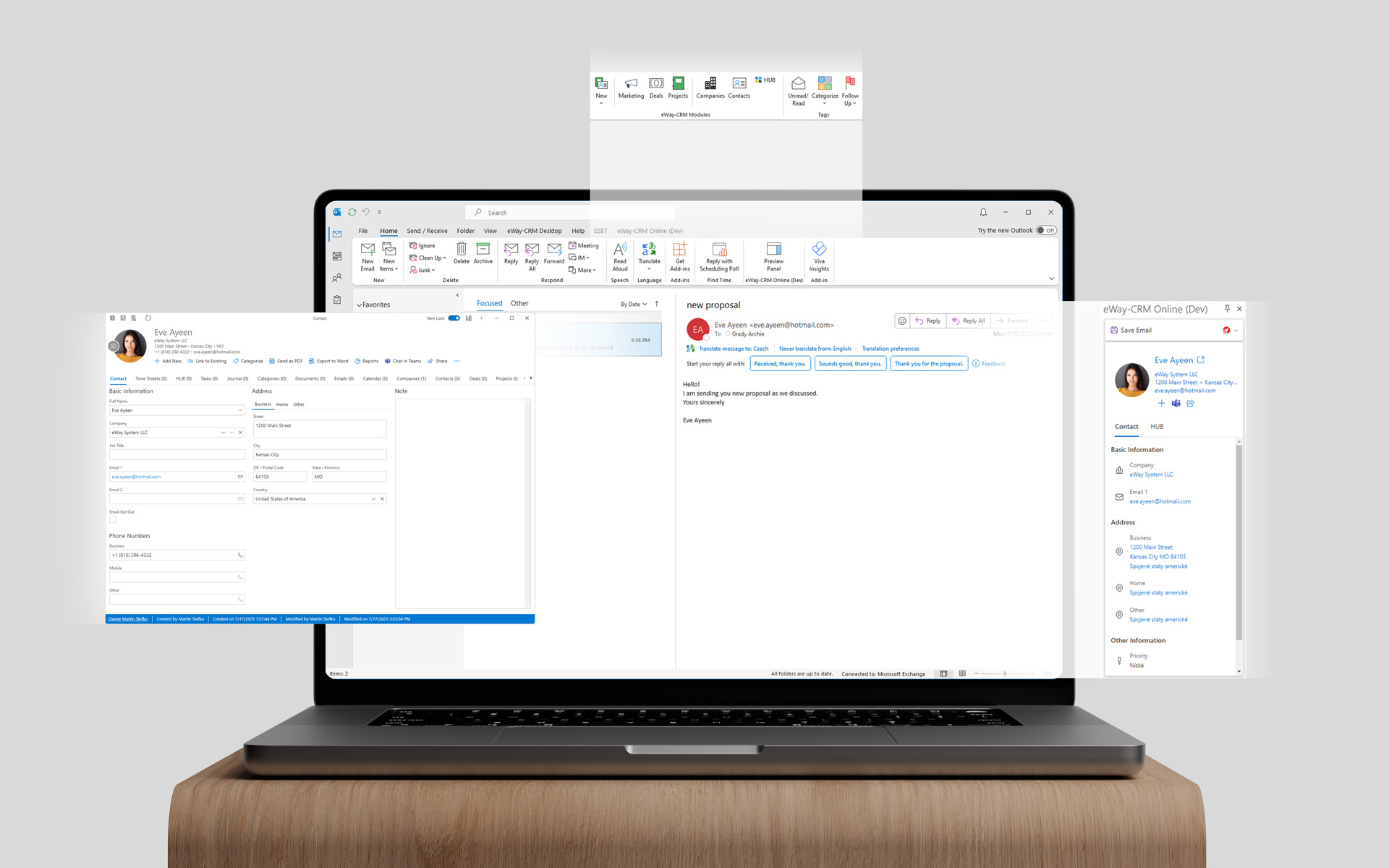Streamlining Operations in the Manufacturing Industry: Discover the Perfect CRM Software
Have you ever paused to fully consider the multi-faceted operations of the manufacturing industry? Amid its highly complex dynamics, there's a need to ensure fluid processes and clear client communications. But what if the most effective solution has been under our noses all this time?

Envision the strength of a CRM system specifically crafted for the manufacturing sector, working harmoniously with a popular tool like Microsoft Outlook. This pairing combines the convenience of a familiar platform with the potent capabilities of the best CRM software for manufacturing businesses.
This isn't mere speculation. It's a practical blend designed to offer manufacturing businesses unparalleled advantages. By emphasizing efficiency, productivity, and organization, merging Outlook with a CRM can significantly elevate operational standards.
The impact of this integration is evident, especially when juxtaposed with the prevalent challenges in manufacturing.
The Complex Terrain of Manufacturing
Manufacturing is more than just creating products; it's a dance of intricate operations that often overlap, intersect, and sometimes clash. Every step in the production line is vital, with each phase impacting the next. These operations include:
- Scale and Nuances: From small-scale assembly lines to colossal manufacturing plants, the scale varies, but the complexity remains consistent. Numerous steps, from design and prototyping to final assembly, involve meticulous planning and execution.
- Multiple Departments, One Goal: A product's journey isn't solitary. It traverses through various departments – be it R&D, production, quality checks, or sales. Collaboration is not just beneficial; it's essential. Seamless interaction between these departments ensures efficiency and consistency.
- The Inventory Jigsaw: Beyond the finished goods lie layers of inventory management. Raw materials, semi-finished goods, and spares – each has its storage, tracking, and replenishment requirements. Mismanagement at this stage can lead to production halts and increased costs.
- Client Interactions: Amidst the bustling operations, manufacturers cannot lose sight of their clients. Regular updates, feedback collection, or even addressing grievances play a pivotal role in building lasting relationships.
- The Compliance Web: As the manufacturing landscape evolves, so do its governing rules. From safety standards to environmental regulations, adherence is non-negotiable. In a highly competitive industry, non-compliance isn't just about penalties; it's about reputation.
Discover the numerous ways that eWay-CRM supports the manufacturing industry, from email tracking to sales pipeline management.
The Domino Effect of a Disorganized System
In the manufacturing world, organization isn't just about neatness—it's the backbone of a fluid, efficient, and profitable operation. But what happens when this backbone weakens, or worse, fractures? The answer lies in the cascading effects of a disorganized system.
- Missed Opportunities: Without a centralized hub for communication, important emails may get overlooked or lost, leading to missed business opportunities or strained client relationships.
- Bottlenecks in Production: Disorganization can result in missing inventory information, leading to unexpected halts in the production line. A single delay can throw off an entire production schedule, affecting timelines and bottom lines.
- Communication Gaps: A lack of coherent communication tools can result in teams working in silos. This disjointedness can lead to repeated efforts, unaligned goals, and wasted resources.
- Financial Repercussions: Mismanagement of client interactions and inefficient tracking of orders can lead to invoicing errors. Such mistakes don't just strain the financial department but can also damage client trust.
- Operational Inefficiencies: Without an organized system, tracking performance metrics and identifying areas of improvement becomes a challenge. Companies might keep repeating the same mistakes, stunting growth and reducing competitiveness.
- Diminished Employee Morale: Continual chaos not only affects processes but also the people enacting them. A lack of clear workflows can lead to frustration and decreased job satisfaction among employees.
A disorganized system isn't just an internal challenge. Its ripple effects touch every aspect of a manufacturing business, from client relations to the company's reputation. The need for an effective organizational tool like a CRM, integrated with familiar platforms like Outlook, becomes paramount in addressing these challenges.
Overcoming Challenges With the Best CRM for Manufacturing Businesses
Manufacturing, a behemoth industry with intricate processes and myriad players, is not without its unique challenges. Surges in demand, complex supply chains, and evolving technologies all play their part.
Manufacturing CRM assists with the following:
- Demand Forecasting: Manufacturing needs precise predictions. With a CRM's data-driven insights, manufacturers can gauge future demands more accurately, ensuring they neither underproduce nor overstock.
- Transparent Communication: Miscommunications can lead to costly errors. Integrating CRM with Outlook offers a clear communication channel, ensuring everyone, from suppliers to end-users, is informed and aligned.
- Centralized Data Management: Multiple departments mean multiple data points. With an integrated system, data from sales, marketing, production, and distribution can converge, providing a holistic view of operations.
- Supply Chain Efficiencies: Tracking suppliers and managing inventory becomes more effortless with CRM tools. Real-time updates on supply levels and vendor communications can be accessed instantly.
- Automated Marketing Efforts: Manufacturing isn't just about producing; it's also about selling. CRM tools can automate marketing campaigns, targeting potential customers based on their preferences and behaviors, thus maximizing the ROI.
- Enhanced Customer Service: With all customer interactions, from emails to purchase histories, stored in one place, the customer service team can address issues more efficiently and offer solutions faster.
In the dynamic world of manufacturing, challenges are inevitable. However, with the robust capabilities of an integrated CRM solution, these challenges can be transformed into opportunities for growth and innovation.
The Synergy of Outlook Integration in Modern CRM Solutions

The manufacturing landscape has seen a tectonic shift, driven by technological advancements and evolving consumer demands. Amid these shifts, the need for enhanced communication and collaboration tools has never been more pronounced.
So we’ve already established how a CRM is an essential tool for the manufacturing industry, but what happens when this tool is integrated with Microsoft Outlook? And how does it provide valuable solutions? Let’s explore.
This powerful integration of a CRM and the familiar Outlook tool offers the following:
- Unified Interface: With Outlook being a preferred communication channel for many businesses, a CRM that integrates with it provides a unified platform. Users can manage emails, calendar events, tasks, and CRM activities without toggling between different applications.
- Real-time Updates: Every time an email is sent, received, or even just read, the corresponding CRM record can be updated in real-time. This ensures everyone in the team is always on the same page, reducing the chances of miscommunication or overlooked details.
- Streamlined Workflows: With both tools combined, processes such as lead tracking, order management, and after-sales service become more streamlined. Automated workflows can be established, ensuring no step is skipped or delayed.
- Tailored Customer Interactions: Integrated systems allow for personalization. When a customer sends an email, their entire history with the company can be retrieved from the CRM, allowing for a more personalized and informed response.
- Enhanced Data Security: Both Outlook and modern CRMs prioritize data security. Integration ensures that sensitive customer data remains protected, fostering trust and compliance.
- Mobility and Accessibility: Many CRM solutions that integrate with Outlook also offer mobile and web versions. This allows teams to access crucial data and communications on the go, ensuring uninterrupted productivity.
eWay-CRM: The Game-Changer for the Modern Manufacturing Landscape

To thrive and innovate, there's an acute need in the manufacturing industry for a CRM that not only optimizes operations but also aligns with the rapid pace of change. And this vein, eWay-CRM truly stands out.
The synthesis of eWay-CRM with Microsoft Outlook emerges as an answer to this need, presenting a bespoke solution tailored for the manufacturing arena.
Let’s examine the top six ways eWay-CRM achieves this:
- Seamless Integration into a Familiar Territory:
The magic of eWay-CRM lies in its ability to transform Outlook, a platform known to many, into an all-encompassing CRM. Instead of navigating through disparate systems, manufacturers find everything they need – from customer relations to sales analytics – within one cohesive space. - Strategic Operational Enhancements:
Time, in manufacturing, is more than just money; it's about reputation, quality, and client trust. The reminders and notifications provided by eWay-CRM, from inventory adjustments to order placements, ensure that potential hiccups are addressed promptly. Its automated workflows make order processing a streamlined endeavor, leading to improved efficiency and punctuality. - Revolutionizing Communication & Collaboration:
Crystal-clear communication is the backbone of effective manufacturing operations. eWay-CRM, combined with Outlook's adept email management, establishes a centralized communication hub. This hub not only facilitates rapid inter-departmental exchanges but also strengthens ties with suppliers, guaranteeing timely raw material procurement and quality assurance. - Data Empowerment & Proactive Planning:
Information drives decisions. With eWay-CRM’s comprehensive data repository, manufacturers access real-time insights into pivotal sales metrics. Synchronized with Outlook, it offers a panoramic view of demand, ensuring that production remains in harmony with market needs, thus preventing costly overproduction or stock deficits. - Efficiency Beyond the Desk:
Manufacturing doesn’t remain confined to the desk. eWay-CRM, with its multi-platform accessibility, ensures that whether stakeholders are supervising the factory floor or attending an overseas conference, they’re never detached from essential updates. This mobility provides a perpetually connected and informed decision-making process. - Adaptability & Financial Acumen:
Catering to manufacturers of varying scales, eWay-CRM’s adaptable pricing model starts free and evolves as businesses grow. This scalability ensures that whether you're a startup or an industry titan, there's a solution tailored to your financial capabilities.
The symbiosis of eWay-CRM and Microsoft Outlook isn't just a software synergy. It's a pioneering step, positioning manufacturing entities on the vanguard of operational excellence and customer-centricity.
It’s not merely about navigating the present, but crafting a future where efficiency and foresight lead the way.
The Road Ahead for Manufacturing Efficiency
In the age of digital transformation, the manufacturing sector constantly seeks the next innovation to elevate operational efficiency. But amidst the noise of countless software solutions, the essence is clear: integration and adaptability hold the key.
Embedding the best CRM software for manufacturing, like eWay-CRM, into commonly-used platforms such as Outlook, can significantly impact the bottom line. The combination not only streamlines processes but also offers an intuitive user experience.
With such tools at the industry's disposal, it's a pivotal moment for manufacturers. Will they harness these integrative solutions to sculpt the future of manufacturing, or will they find themselves playing catch-up in an ever-evolving market landscape? The choice, and the potential rewards, are substantial.
Take the next best step for your business and become informed on the 5 Simple Steps to Enable CRM in Outlook for Smarter Customer Management.











